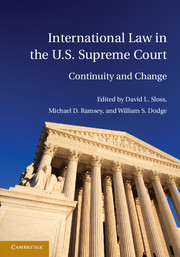Book contents
- Frontmatter
- Contents
- List of Contributors
- Table of Cases
- Acknowledgments
- Introduction
- PART I FROM THE FOUNDING TO THE CIVIL WAR
- PART II FROM THE CIVIL WAR TO THE TURN OF THE CENTURY
- PART III FROM THE TURN OF THE CENTURY TO WORLD WAR II
- 6 Treaties in the Supreme Court, 1901–1945
- 7 Customary International Law in the Supreme Court, 1901–1945
- 8 International Law as an Interpretive Tool in the Supreme Court, 1901–1945
- 9 Varieties and Complexities of Doctrinal Change: Historical Commentary, 1901–1945
- PART IV FROM WORLD WAR II TO THE NEW MILLENNIUM
- PART V INTERNATIONAL LAW IN THE U.S. SUPREME COURT IN THE TWENTY-FIRST CENTURY
- V.A TREATIES AFTER 2000
- V.B CUSTOMARY INTERNATIONAL LAW AFTER 2000
- V.C INTERNATIONAL LAW AND CONSTITUTIONAL INTERPRETATION AFTER 2000
- V.D INTERNATIONAL LAW AND STATUTORY INTERPRETATION AFTER 2000
- V.E INTERNATIONAL LAW AND THE WAR ON TERROR
- VI CONCLUSION
- Index
- References
7 - Customary International Law in the Supreme Court, 1901–1945
Published online by Cambridge University Press: 05 July 2011
- Frontmatter
- Contents
- List of Contributors
- Table of Cases
- Acknowledgments
- Introduction
- PART I FROM THE FOUNDING TO THE CIVIL WAR
- PART II FROM THE CIVIL WAR TO THE TURN OF THE CENTURY
- PART III FROM THE TURN OF THE CENTURY TO WORLD WAR II
- 6 Treaties in the Supreme Court, 1901–1945
- 7 Customary International Law in the Supreme Court, 1901–1945
- 8 International Law as an Interpretive Tool in the Supreme Court, 1901–1945
- 9 Varieties and Complexities of Doctrinal Change: Historical Commentary, 1901–1945
- PART IV FROM WORLD WAR II TO THE NEW MILLENNIUM
- PART V INTERNATIONAL LAW IN THE U.S. SUPREME COURT IN THE TWENTY-FIRST CENTURY
- V.A TREATIES AFTER 2000
- V.B CUSTOMARY INTERNATIONAL LAW AFTER 2000
- V.C INTERNATIONAL LAW AND CONSTITUTIONAL INTERPRETATION AFTER 2000
- V.D INTERNATIONAL LAW AND STATUTORY INTERPRETATION AFTER 2000
- V.E INTERNATIONAL LAW AND THE WAR ON TERROR
- VI CONCLUSION
- Index
- References
Summary
The U.S. Supreme Court's most momentous case for customary international law in the early twentieth century – and perhaps in its entire history – involved a man injured while walking home along a railroad track in Pennsylvania. Erie Railroad Co. v. Tompkins, a wholly domestic tort case decided in 1938, fundamentally changed the way federal courts think about common law. In doing so, it had important yet inscrutable implications for how federal courts should think about customary international law – implications that remain debated to this day. The story of the Supreme Court and customary international law in the early twentieth century is, therefore, to a large extent a story about Erie.
That is so as well because in other respects the early twentieth century was not a fertile period for the direct application of customary international law in U.S. courts. Many staples of international law adjudication in the nineteenth century – pirates, prizes, and privateers – faded or disappeared altogether. The United States of course played an increasingly prominent role on the world stage through its acquisition of overseas territory, its participation in two world wars, and its engagement with an increasingly transnational economic system. But for various reasons these events did not produce an extensive record of the direct application of customary international law. Among other things, the period saw a rise of treaties and statutes, often reducing customary international law's role to a supporting one as a tool of interpretation.
- Type
- Chapter
- Information
- International Law in the U.S. Supreme Court , pp. 225 - 256Publisher: Cambridge University PressPrint publication year: 2011



